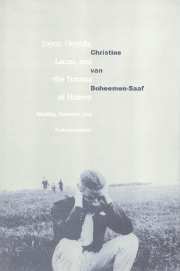Book contents
- Frontmatter
- Contents
- Acknowledgments
- List of abbreviations
- Chapter 1 The stolen birthright: the mimesis of original loss
- Chapter 2 Representation in a postcolonial symbolic
- Chapter 3 The language of the outlaw
- Chapter 4 The primitive scene of representation: writing gender
- Chapter 5 Materiality in Derrida, Lacan, and Joyce's embodied text
- Conclusion: Joyce's anamorphic mirror
- Bibliography
- Index
Chapter 4 - The primitive scene of representation: writing gender
Published online by Cambridge University Press: 22 September 2009
- Frontmatter
- Contents
- Acknowledgments
- List of abbreviations
- Chapter 1 The stolen birthright: the mimesis of original loss
- Chapter 2 Representation in a postcolonial symbolic
- Chapter 3 The language of the outlaw
- Chapter 4 The primitive scene of representation: writing gender
- Chapter 5 Materiality in Derrida, Lacan, and Joyce's embodied text
- Conclusion: Joyce's anamorphic mirror
- Bibliography
- Index
Summary
“astronomically fabulafigured; … the last half versicle repurchasing his pawned word”
Finnegans WakeJoyce's mimesis of loss inscribes the “death-in-life” of trauma into his text and vitiates the power of literature to incarnate truth and serve as a mirror to sustain the reader's sense of coherent subjectivity. In the discussion of “Cyclops” we noted that Joyce occupies the void hollowed by the sense of lack of a mother tongue, from where he wages war on hegemonic representation. The question remains: How could Joyce face the terror of meaninglessness? In this chapter, I want to address Joyce's strategy of coping with the “castration” which he inflicts on representation and the reader; and I shall argue that it is his fetishistic handling of the possibility of diminishment, loss, or difference, which should be seen in a historical perspective. The double relation to sexual difference of the Irish male facilitates a double take on sexual identity. Identified as the son of Mother Ireland — an ambivalent relation which locks the son forever in the mother's womb as well as lending him a distinct, masculine social identity — Joyce invented a deconstructive strategy of writing difference which styles itself feminine, and which is particularly modern, because it anticipated the western drive to commodify sexuality, especially female sexuality, so characteristic of our own age.
- Type
- Chapter
- Information
- Joyce, Derrida, Lacan and the Trauma of HistoryReading, Narrative, and Postcolonialism, pp. 120 - 154Publisher: Cambridge University PressPrint publication year: 1999



